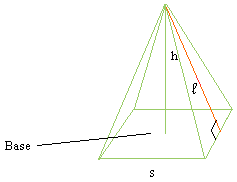Surface area of a square pyramid
It is not complicated to derive the formula of the surface area of a square pyramid. Start with a square pyramid as shown below and call the length of the base s and the height of one triangle l.
The word slant refers also to something that is oblique, bent, or something that is not vertical or straight up. Basically, anything that is not horizontal or vertical!
Take a close look again at the slant height (red line) and you can see that the line is not vertical.
Here is how to derive the surface area of a square pyramid.
Surface area of the square pyramid = area of the base + area of 4 triangles.
The area of one triangle is (s × l)/2
Since there are 4 triangles, the area is 4 × (s × l)/2 = 2 × s × l
Therefore, the surface area, call it SA is SA = s2 + 2 × s × l
A couple of examples showing how to find the surface area of a square pyramid.
Example #1:
Find the surface area of a square pyramid with a base length of 5 cm, and a slant height of 10 cm.
SA = s2 + 2 × s × l
SA = 52 + 2 × 5 × 10
SA = 25 + 10 × 10
SA = 25 + 100
SA = 125 cm2
Example #2:
Find the surface area with a base length of 3 cm, and a slant height of 2 cm.
SA = s2 + 2 × s × l
SA = 32 + 2 × 3 × 2
SA = 9 + 6 × 2
SA = 9 + 12
SA = 21 cm2
Example #3:
Find the surface area with a base length of 1/2 cm, and a slant height of 1/4 cm.
SA = s2 + 2 × s × l
SA = (1/2)2 + 2 × 1/2 × 1/4
SA = (1/2)×(1/2) + 2 × 1/2 × 1/4
SA = 1/4 + 1 × 1/4
SA = 1/4 + 1/4
SA = 2/4
SA = 1/2 cm2